
Singapore, 6 October 2021 – The Asia Pacific Leaders Malaria Alliance (APLMA) and Asia Pacific Malaria Elimination Network (APMEN) are delighted the World Health Organization has endorsed the use of the world’s first malaria vaccine,RTS,S/AS01,providingcucial protection against malaria in young children in sub-Saharan Africa. The news is a significant step forward for the malaria and scientificcommunity, particularly for high-burden countries within Asia Pacific. APLMAandAPMEN congratulate all those who made this milestone to safeguard the mostvulnerable against malaria possible.
“After more than three decades of research and development, the relentless resolve and action from the global malaria community has paved the way for this scientific breakthrough”, said Prof Tikki Pangestu, Board Chair of APLMA and co-chair of Asia Pacific Immunization Coalition. “The innovation is a welcome springboard and lays the foundation for next-generation innovations in Asia Pacific’s pursuit to be malaria-free by 2030.”
Dr Sarthak Das, CEO of APLMA, said, “This is a huge milestone which complements our existing arsenal of tools to combat malaria, particularly for our most hard to reach and vulnerable populations. We have made tremendous strides towards eliminating malaria in Asia Pacific and this announcement provides hope for high burden countries in the region. It's critical now that we galvanize this attention and focus on improving service delivery and healthcare infrastructure to reach the last mile and accelerate progress towards regional elimination.”
Over the past ten years, countries in the Asia Pacific region have almost halved the number of malaria deaths and cases and have continued to make impressive gains towards eliminating malaria by 2030, making a significant difference to the lives of millions of people across Asia Pacific. At the same time, there is still much to be achieved in the last stretch to malaria elimination by 2030, in Asia Pacific and of course our neighbors in other parts of the world, including in Africa.
“Progress against malaria is being stalled by different strains and drug-resistantmalaria. In the GMS, P.falciparum malaria is retreating to border and hard-to-reach areas, while P.vivax is a burgeoning challenge for the rest of the region. We must continue to develop and scale up more effective malaria interventions and accelerate the development of new technologies to protect us from all strains of malaria”,commented Amita Chebbi, Senior Director, Asia Pacific Malaria Elimination Network.
The region has a historic opportunity to end malaria, in a time marked by a pandemic. APLMA and APMEN stand committed to support Asia Pacific’s most vulnerable communities by mobilizing innovations and tailored solutions across stakeholders to make the preventable burden of malaria a thing of the past.
###
.svg)


.jpg)



.png)


